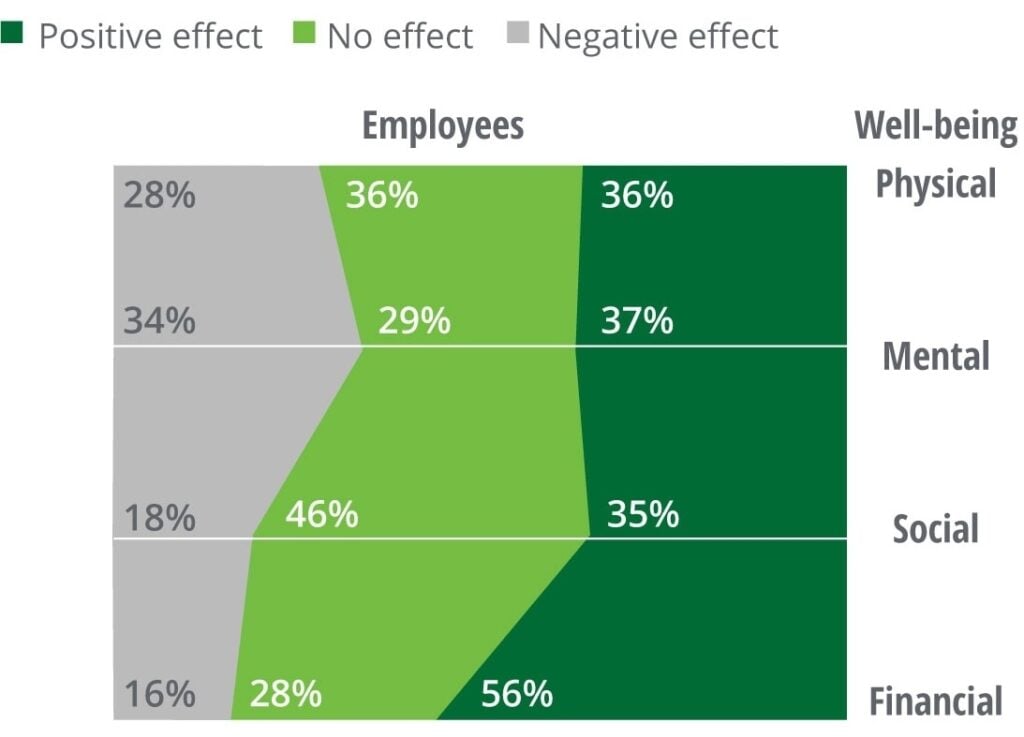A large portion of employees in the U.S. and other countries feel stressed out and/or overworked. Just looking up all the studies supporting this feels like overwork. They include survey results from the Pew Research Center, Gallup, the American Psychological Association, and Deloitte. More, often more-dramatic, surveys come from companies involved in staffing and workplace management, such as Fiverr, Kelly, Workhuman, and Michael Page.
At the same time, these and many other surveys show employees being worried that artificial intelligence could be too good at relieving this burden—taking over so much of their work that they are shown the door. The latest data on that come from the new 2024 Work Trend Index Annual Report by LinkedIn and its AI-centric parent company, Microsoft, which surveyed 31,000 workers across 31 countries. Fifty-three percent of workers employing AI on the job worry that using it for important tasks will show that the machines can replace them.

Higher Productivity and More Work?
The reality may lie somewhere in between. AI might take over a tremendous amount of workplace duties—especially among desk jockeys, aka “knowledge workers.” But rather than allowing them to go home conspicuously early, this productivity boost might merely let them go home a bit less late.
That’s a possible takeaway from connecting some dots in the Work Trend Index. For instance, 75% of office workers are already using AI on the job. Virtually the same portion, 78%, aren’t waiting for their bosses. They are signing up for AI services independently—what LinkedIn and Microsoft call “bring your own AI.” One more figure may explain their eagerness: 68% of survey takers said they struggle with the pace and volume of work.

That’s a higher portion than some studies about workplace stress have shown, although they are a bit older. For instance, in the March 2023 Pew Study, “How Americans View Their Jobs,” 29% of over 5,000 people surveyed said their job is stressful, and 19% said it is overwhelming all or most of the time. The younger the workers, the higher the percent who felt that way.

The 2023 edition of Gallup’s annual Work and Workplace survey offered a milder view, with 7% saying they were somewhat dissatisfied with the amount of work required and another 7% being completely dissatisfied. (Larger percentages reported dissatisfaction with workplace stress, which may involve more than just the workload.)
Bigger Demands in Some Job Sectors
However, the LinkedIn-Microsoft study focuses on these knowledge workers who may be most inundated with endless meetings, emails, instant messages, and other busy work. They may also face the expectation of long hours and downsizing after the Covid hiring boom. “I’m a senior manager at a technology company living in New York City,” said Emma Fairchild Barge on the New York Times tech podcast Hard Fork last week. “What I see in my daily life and across my peer set too is a massive feeling of workplace overload and being asked to do too much with too little.”
Fairchild Barge was one of about a hundred people who replied to the podcast’s call for examples, stories, or anecdotes about their use of generative AI at work. According to cohost Casey Newton, her story, “reflected a feeling that came up over and over again, which is that so many workers these days are turning to these AI tools because the demands of their jobs just keep increasing and increasing, and they are not getting any more help, right?”
This is a dark flipside to the predictions that AI will make workers so much more productive and free them from the most time-consuming drudge work. Newton’s counterpart, Kevin Roose, mused that all this time-savings might just provide an excuse for managers to heap more work on employees to keep them just as busy, or busier.
Perhaps some of that extra work will be shifted from other, less AI-savvy employees whom the tech did end up replacing.
How Hard Will Bosses Push?
On the positive side, not all bosses are perceived as relentless taskmasters. In the same Pew Study, 62% of people reported being either extremely or very satisfied with their relationship with a manager or supervisor. Seventy-eight percent said that they are treated with respect at work “all or most of the time.”
Although policy isn’t necessarily determined by middle managers. Tone and direction are set higher up. The June 2022 Deloitte study, “The C-suite’s role in well-being,” paints a grim picture for that. Of 1,050 C-suite leaders surveyed in the U.S., UK, Canada, and Australia, 91% said that they care about their employees wellbeing. Among an equal number of employees, just 56% thought that their executives cared.








